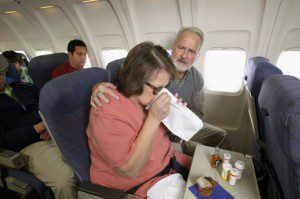 Air travelers are up to 100 times more likely to catch a cold or the flu while flying than during normal day-to-day activities.
Air travelers are up to 100 times more likely to catch a cold or the flu while flying than during normal day-to-day activities.
The primary cause for an increased rate of infection is low cabin humidity on planes. Most airplanes fly in an elevation range of 30,000 to 35,000 feet, where humidity is much lower. At very low levels of humidity, our natural defense system of mucus in our noses and throats dries up, creating an ideal environment for germs to infect us.
The best way to maintain these natural defenses is to stay hydrated. Drinking plenty of water will not only counter the overall dehydrating effects of air travel, but it can actually strengthen the body’s natural immune system.
It is recommended to sip water regularly throughout the flight rather than drink a large amount at once to protect against long dry spells in your defense system. Hot beverages are a good way to keep your protective mucous membranes working because they assist in keeping you generally hydrated and also provide moisture in the form of steam. Conversely, it is recommended that you avoid caffeine or alcoholic beverages as they can dehydrate you.
Using nasal sprays or saline mists have also been proven to be an effective means of keeping mucous membranes in your nose and throat moist. They can increase your resistance to infection while on a dry aircraft. Yet another way to defend against viruses while flying is to use a germ-killing mouthwash, which adds another layer of protection while simultaneously helping to keep your throat moist. Other experts recommend taking vitamins before flights to help boost immunity levels.
By following these tips and practicing proper hand washing behavior, you will greatly increase your chances of arriving at your destination healthy.
All content of this newsletter is intended for general information purposes only and is not intended or implied to be a substitute for professional medical advice, diagnosis or treatment. Please consult a medical professional before adopting any of the suggestions on this page. You must never disregard professional medical advice or delay seeking medical treatment based upon any content of this newsletter. PROMPTLY CONSULT YOUR PHYSICIAN OR CALL 911 IF YOU BELIEVE YOU HAVE A MEDICAL EMERGENCY.
